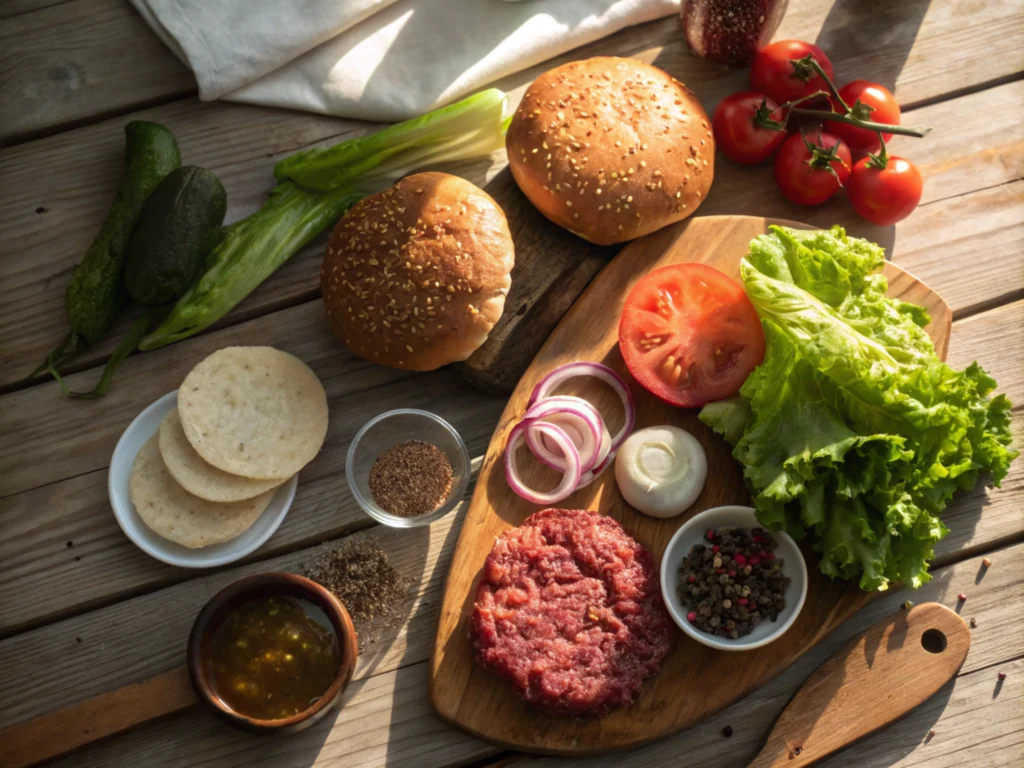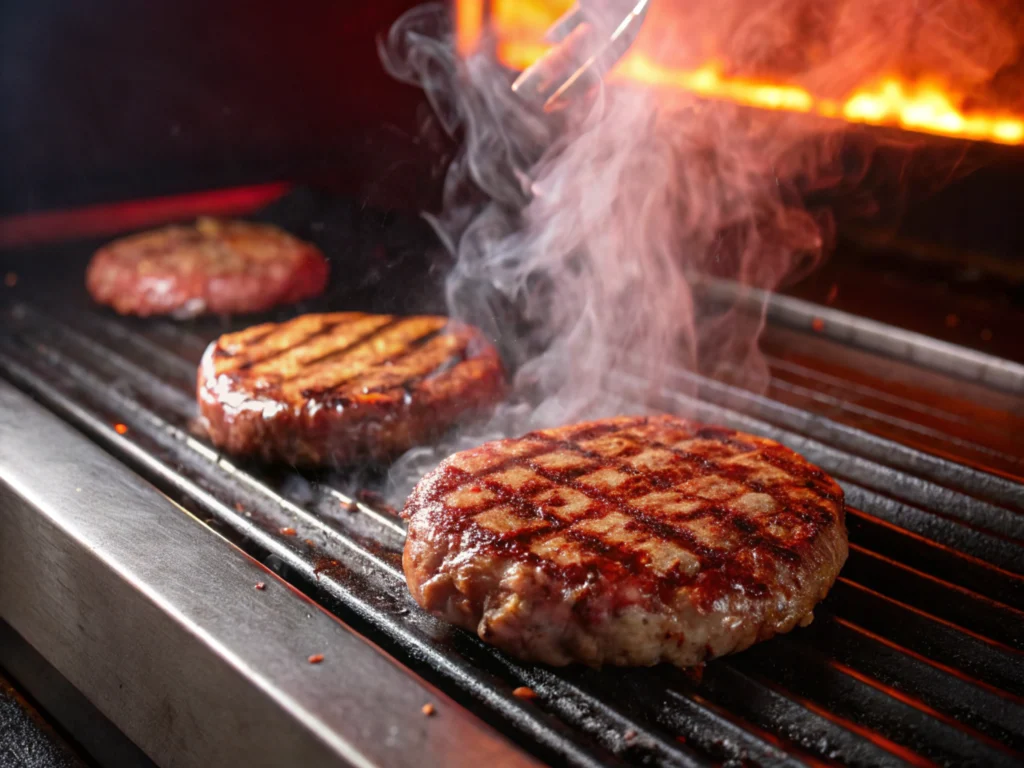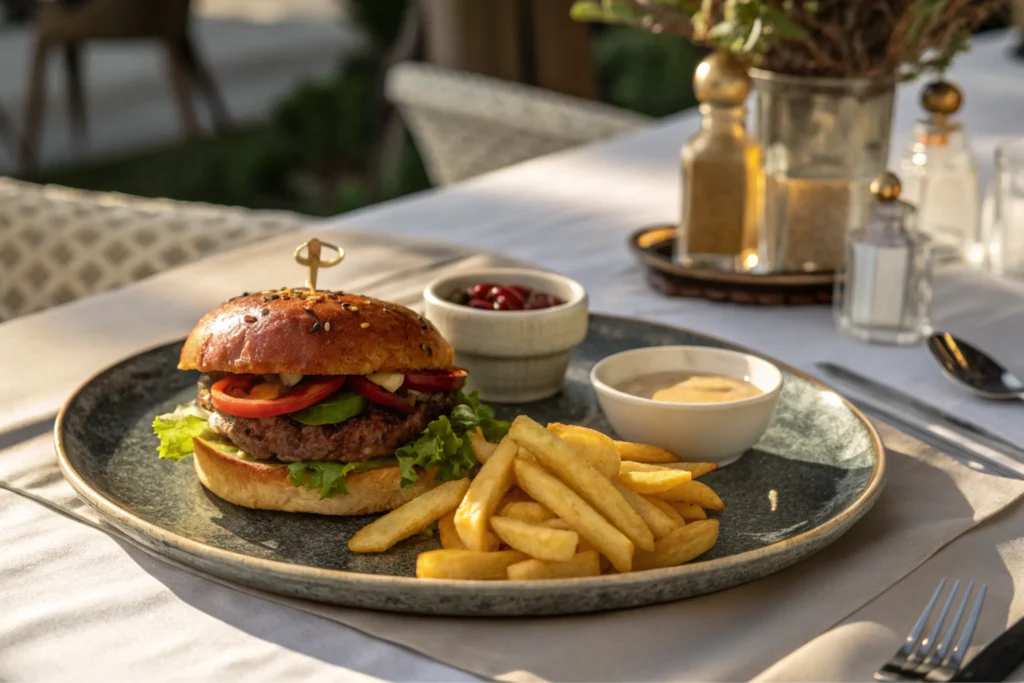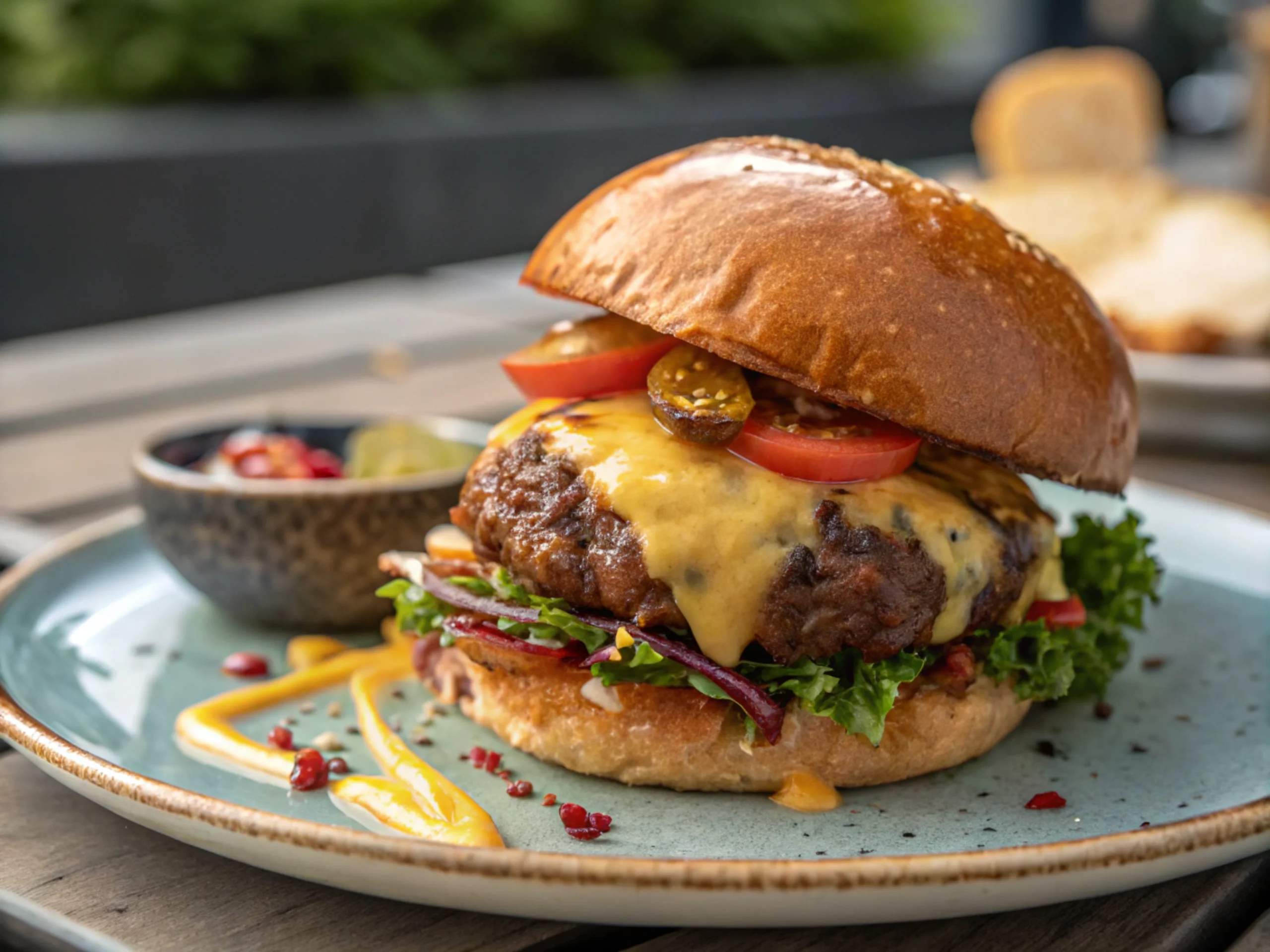Burgers have become a beloved global food, blending cultures and flavors in every bite. For individuals adhering to halal dietary guidelines, understanding what makes a burger halal is more than a culinary curiosity—it’s a necessity. Halal dietary laws, derived from Islamic principles, ensure that food is both permissible and ethically prepared. This guide explores the ingredients, certification processes, and preparation techniques behind halal burgers, providing insights and tips for enthusiasts seeking to enjoy this iconic dish while respecting religious guidelines.
Table of contents
Understanding Halal in Food Preparation
Halal, meaning “permissible” in Arabic, undeniably governs what Muslims can consume. Specifically, in the context of food, halal preparation explicitly encompasses everything from sourcing and slaughtering animals to the meticulous handling of ingredients. Moreover, the cornerstone of halal food undoubtedly lies in the Zabiha process, which is, in particular, a specific method of slaughter that, above all, prioritizes humane treatment and cleanliness.
Key Principles of Halal Preparation
- Ethical Sourcing: Animals must be treated with respect and care throughout their lives. This includes proper feeding and housing, with no exposure to stress or harm.
- Humane Slaughter: The Zabiha method requires a swift, single cut to the jugular vein while invoking the name of Allah. This process ensures the animal experiences minimal pain.
- Avoidance of Haram Ingredients: Pork, alcohol, and improperly sourced meat are strictly prohibited. Even trace amounts of these substances can render food non-halal.
For burger lovers, these principles, above all, translate into a thoughtful and ethical approach to food preparation. Specifically, from the meat used in patties to the sauces and toppings, every element must, without a doubt, align with halal requirements. Furthermore, this ensures that the entire meal, from start to finish, is prepared in accordance with these meticulous guidelines.
For a deeper dive into the versatility of burgers, consider exploring the Brisket Burger Guide, which offers innovative ideas for creating rich, flavorful variations.

Key Ingredients in a Halal Burger
Creating a halal burger goes beyond choosing halal-certified meat. Every component must meet strict standards to ensure the final product is fully compliant. Here’s a closer look at the key ingredients:
1. Halal-Certified Meat
The meat is the star of any burger. For a burger to be considered halal, the animal must be slaughtered following the Zabiha process. Popular choices include beef, lamb, chicken, and even fish, all of which can be sourced as halal-certified.
Quality Assurance
Halal certification guarantees not only compliance with religious practices but also quality and hygiene. The meat is free from contaminants, and the slaughter process ensures the animal was healthy and free from disease at the time of processing.
2. Buns
The bun might seem like an afterthought, but it plays a crucial role in maintaining halal compliance. Breads containing lard, mono- and diglycerides (from non-halal sources), or alcohol-based preservatives are not permissible. Many halal burgers use brioche or whole-grain buns, provided they meet halal standards.
Gluten-Free and Vegan Options
For those with dietary restrictions beyond halal, gluten-free or vegan buns can offer a safe alternative. However, even these must be verified as halal to avoid cross-contamination.
3. Sauces and Condiments
Condiments elevate a burger, but many commercially available options contain non-halal ingredients. For instance, Worcestershire sauce often includes anchovies processed in non-halal ways, and some ketchups and mustards use wine-based vinegar. Halal-certified versions of these products are widely available, ensuring that every bite is flavorful and compliant.
Homemade Alternatives
Making sauces at home is another excellent way to maintain halal standards. Ingredients like halal-certified vinegar, fresh herbs, and spices can create delicious and customizable condiments.
4. Additional Toppings
From fresh produce to cheeses, the toppings on a halal burger should enhance the flavor without compromising compliance. Fresh lettuce, tomatoes, and onions are always safe options. When it comes to cheese, ensure it is made without animal rennet unless the rennet is halal-certified.
Innovative Toppings
For adventurous eaters, consider, above all, adding avocado slices, grilled mushrooms, or halal-certified turkey bacon for a gourmet twist. Moreover, these toppings can, undoubtedly, transform a simple burger into a culinary masterpiece. Additionally, by thoughtfully selecting these ingredients, you can, in particular, elevate your meal while still adhering to halal requirements.

How Halal Certification Works
Halal certification ensures that a product or establishment meets Islamic dietary requirements. This certification process is rigorous, with inspections covering every aspect of production, from sourcing raw materials to the final packaging.
The Certification Process
- Initial Assessment: Certifying bodies inspect suppliers and facilities to ensure compliance with halal guidelines.
- Ingredient Verification: Each ingredient is examined to confirm it is free from haram substances. This step often involves detailed documentation and laboratory testing.
- On-Site Inspections: Regular visits to processing facilities ensure adherence to cleanliness and ethical practices.
- Labeling: Once certified, products can display an official halal logo, making them easily identifiable to consumers.
Why Certification Matters
Halal certification provides peace of mind for consumers, assuring them that their food adheres to their religious and ethical values. It also fosters trust in brands and establishments, making it easier for Muslims to access high-quality, compliant products.
For more ideas on incorporating halal practices into your cooking, try this Turkey Ribs Recipe. It combines rich flavors with a commitment to halal principles.
What is Halal-Certified Ground Beef?
Ground beef is a versatile ingredient, perfect for burgers and beyond. When halal-certified, it undergoes stringent processes to ensure compliance with Islamic dietary laws. From the way the animal is raised to how the meat is processed, every step adheres to ethical and hygienic standards.
The Slaughter Process
The Zabiha method requires the butcher to invoke the name of Allah before slaughtering the animal with a swift, precise cut. This process not only fulfills religious requirements but also ensures the animal is treated humanely. The thorough draining of blood, a hallmark of halal practices, enhances the cleanliness and quality of the meat.
The Grinding Process
After slaughter, the meat is inspected for contaminants and prepared for grinding. The grinding process itself must take place in a halal-certified facility to prevent cross-contamination with non-halal products.
Health Benefits
Halal-certified ground beef is often considered cleaner and healthier due to the meticulous slaughter and preparation process. The absence of blood and contaminants contributes to better flavor and longer shelf life.
Halal vs. Regular Beef
While halal and regular beef may appear similar at first glance, the differences lie in the preparation, sourcing, and certification processes.
Ethical Sourcing
Halal beef prioritizes humane treatment and ethical sourcing, often aligning with higher standards for animal welfare compared to conventional beef production.
Preparation and Handling
Halal beef undergoes thorough inspections and is processed in certified facilities, ensuring it is free from contamination. Regular beef, on the other hand, may not adhere to the same strict protocols.
Cross-Contamination
In halal processing, every effort is, undoubtedly, made to prevent cross-contamination with non-halal products. Moreover, this level of diligence explicitly ensures that the final product is, above all, entirely compliant with Islamic dietary laws. Additionally, such meticulous attention to detail, in particular, reflects the commitment to maintaining purity and integrity throughout the preparation process.

Recipes and Tips for a Perfect Halal Burger
Creating the perfect halal burger involves more than following a recipe—it’s about understanding and respecting the principles of halal while embracing culinary creativity. This section provides a detailed recipe and practical tips to help you craft a mouthwatering halal burger at home.
Halal Burger Recipe
Ingredients:
- 1 lb halal-certified ground beef or lamb
- 1 tsp salt
- ½ tsp black pepper
- 1 tsp garlic powder
- 1 tsp onion powder
- 1 tbsp olive oil
- 4 halal-certified burger buns
- Toppings: lettuce, tomato slices, halal cheese, and sauces (e.g., mayo, ketchup)
Instructions:
- Prepare the Patties:
In a large mixing bowl, combine the ground beef with salt, pepper, garlic powder, and onion powder. Mix gently until the seasoning is evenly distributed. Form the mixture into four equal patties. - Cook the Patties:
Heat olive oil in a skillet over medium heat. Cook each patty for 4-5 minutes on one side until browned. Flip and cook for another 3-4 minutes or until the internal temperature reaches 160°F.

- Toast the Buns:
Lightly toast the burger buns on a skillet for added texture. This step enhances flavor while preventing sogginess. - Assemble the Burgers:
Layer the patties on the toasted buns, adding lettuce, tomato slices, and halal cheese. Finish with your favorite sauces. - Serve:
Pair the burgers with a side of sweet potato fries or a fresh salad for a balanced meal.
For additional inspiration and insights into halal burgers, explore this comprehensive Halal Burger Guide to discover more about halal preparation and creative ideas.
Pro Tips & Variations
1. Experiment with Spices
For a more flavorful patty, try, above all, adding cumin, coriander, or smoked paprika to the meat mixture. Moreover, these spices, undoubtedly, pair well with halal-certified beef or lamb and, in particular, add depth to the burger. Additionally, this approach ensures that the patty is not only delicious but also thoughtfully prepared to align with halal principles.
2. Creative Toppings
Take your halal burger to the next level with unique toppings. Options include caramelized onions, avocado slices, or halal turkey bacon. These additions can transform a basic burger into a gourmet experience.
3. Sauce it Up
Homemade sauces, such as garlic aioli or harissa mayo, are easy to make and add a personal touch to your burger. Ensure all ingredients are halal-certified.
4. Serving Suggestions
For an elevated presentation, serve the burger, above all, on a rustic wooden board with a side of crispy fries, a dipping sauce, and a small salad. Moreover, adding garnishes like fresh parsley or pickles can, undoubtedly, create a professional look. Additionally, this approach, in particular, transforms a simple meal into an impressive dining experience while paying attention to detail.
For more ideas on side dishes or accompaniments, check out this guide on Frozen Soup Dumplings for creative pairings that complement halal meals.

FAQs: Everything You Need to Know About Halal Burgers
This section addresses common questions about halal burgers, helping readers understand the essential aspects of halal preparation, certification, and dining options.
What makes a meat halal?
Halal meat is derived from animals that have been slaughtered following Islamic dietary laws. The process includes reciting a prayer, using a swift cut to the throat, and ensuring the blood is completely drained. The animal must also be healthy and treated humanely throughout its life.
What is a halal-certified burger?
A halal-certified burger contains ingredients that comply with halal guidelines. This includes halal-certified meat, buns, sauces, and toppings. The entire preparation process avoids cross-contamination with non-halal substances.
What makes ground beef halal?
Ground beef is halal when it comes from an animal slaughtered following the Zabiha process. Additionally, the meat must not contain any non-halal additives or preservatives. Processing facilities must also be halal-certified to ensure compliance.
What is the difference between halal and regular beef?
The primary difference lies in the slaughter process and handling. Halal beef adheres to Islamic guidelines, ensuring humane treatment and cleanliness. Regular beef may not follow these specific protocols, potentially allowing for non-halal additives or practices.
Can non-Muslims eat halal burgers?
Yes, halal burgers are suitable for anyone. Many people prefer halal food due to its emphasis on quality, hygiene, and ethical sourcing.
Are all halal burgers spicy?
No, halal burgers are not inherently spicy. The flavor profile depends on the recipe and seasoning used. You can make a mild or spicy halal burger based on your preferences.
How to identify halal-certified restaurants?
Look for official halal certification logos on menus or restaurant signage. Additionally, many establishments list their certification details online or provide verification upon request.
What are common mistakes to avoid when making a halal burger?
- Using non-halal sauces or toppings.
- Cross-contaminating halal ingredients with non-halal ones.
- Overcooking the patties, which can dry out the meat.
Conclusion
Understanding what makes a burger halal is essential for anyone seeking to enjoy this popular dish while respecting Islamic dietary principles. From sourcing halal-certified ingredients to ensuring proper preparation, every step contributes to a flavorful and ethical meal. By following this guide, you can confidently create delicious halal burgers that honor tradition and taste incredible. Whether experimenting with spices or sticking to classic toppings, the possibilities are endless. Try your hand at crafting your perfect halal burger today!

